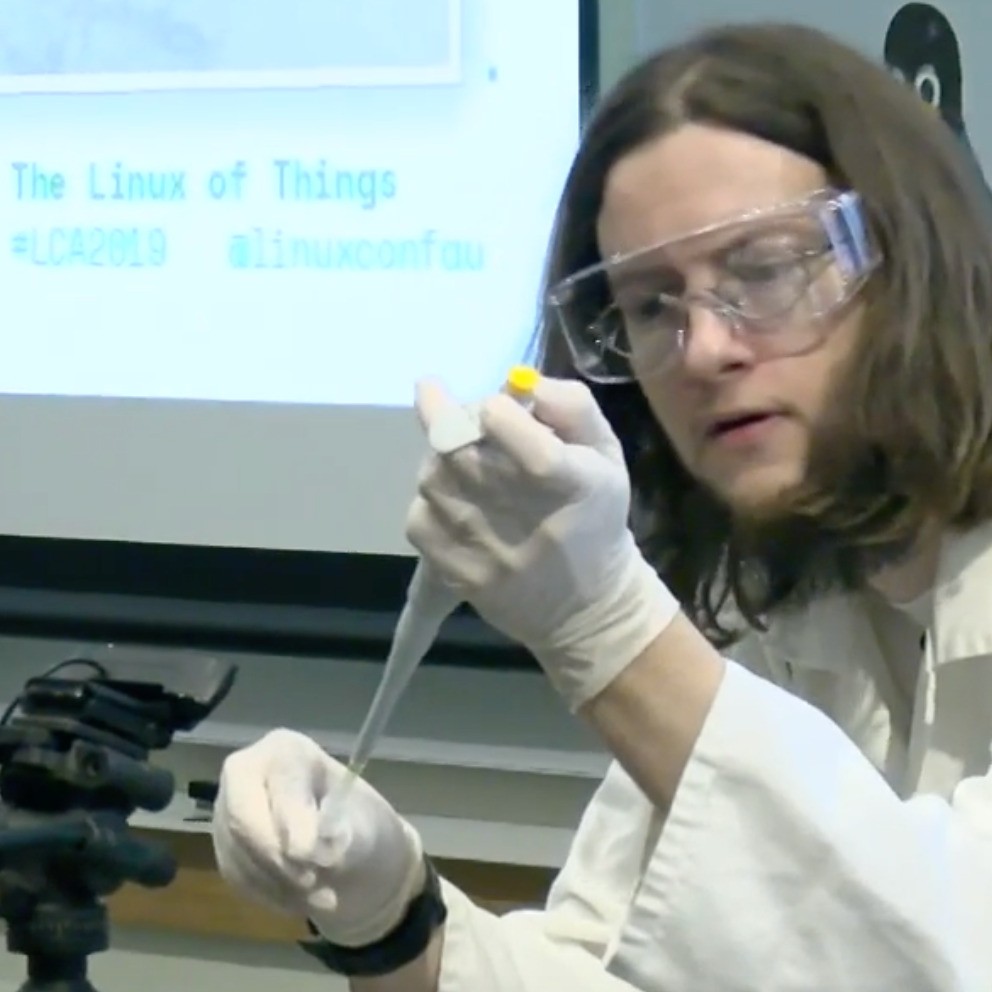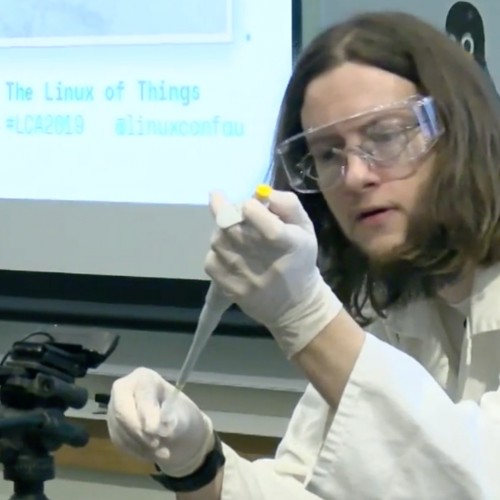Neurodivergent cuddler of data, specialising in interdisciplinary research, with a love for Free Software and the hacking thereof. Rangitāne o Wairau. Te Whanganui-a-tara. He / his.
The Times Higher Ed recently published an article about this suit. It has the following, spot on, quote:
“The for-profit academic publishing industry is in the business of exploiting the goodwill and hard work of brilliant scholars, and of taxpayers who foot the bill to create their product,” Dean Harvey, a partner at Lieff Cabraser, said in a news release.
The full complaint in the lawsuit is at the link below. IMHO, it is time that the academic publishing industry is challenged on their exploitative business model.
[Blended image of two "me"s standing next to a Kauri tree that was planted a few weeks after I was born, about 37 years apart]
Opening karakia from Dr Willy-John Martin [by working together, we will flourish and achieve greatness]
Panelists: Professor Gary Evans (Chief Science Advisor, MBIE), Dr Prue Williams (General manager, Future Research System, MBIE), Dr Willy-John Martin (Director of Māori Research, Science and Innovation, MBIE), Tara Thurlow-Ray (Manager, Future Pathways, MBIE)
Prue Williams
Intro
- Te Ara Paerangi whitepaper launched 6th December, builds on what was heard
- over 900 submissions to green paper
- All views taken and summaries
- Whitepaper includes key policy directions and a roadmap
- The policy document is intended to demonstrate an enduring, multi-year program
Why?
- Innovators and researchers have served well over the past 30 years
- There is a strong desire and need for change
- Whitepaper summarises the need for change, resources have been spread thinly
- Institutions and funding needs to be adapted
- Need to increase the efficiency of the system
- The existing system lacks diversity
- White paper provides a blueprint to address the challenges
Vision Statement
- Four objectives, providing a framework
- People and the ability to adapt will maximise the output
- Key part: embedding Te Tiriti; this will be incorporated into the design
Willy-John Martin
Objective 1 - The impact objective
- Focusing Research, Science and Innovation (RSI) on things that matter
- Focusing resources
- Providing a clear direction from the government, promoting collaboration over unproductive competition
- <...>
- Looking to accelerate the information transfer, and facilitate global collaboration
- Looking to improve and translate discoveries
- Key part: use RSI to make new futures for our country
Objective 2 - Embedding Te Tiriti
- There has previously been inefficient expression
- Overall responsiveness to Te Tiriti has been weak
- Want to embed Te Tiriti aspirations at all levels
- Want to allow Māori to explore their own priorities
- Addressing lower funding issues for Māori, providing for Māori-led National Research Priorities (NRPs)
- Partnering with Māori, and providing them with a dedicated platform
- Crafting a Te Tiriti / Waitangi statement
Tara Thurlow-Ray
Objective 3 - Our greatest asset in RSI is our people
- Valuing our people
- Addressing the issues raised in response to the green paper, especially around career precarity and other things that affect wellbeing
- Greater emphasis on fellowships
- Pathways to <...>
- Key directives: attracting, developing & retaining people; addressing settings that disincentivise long-term employment; grow representation of Māori, women, and Pacific people
- Limited reach, there are existing systemic issues that have led to precarity; a change in infrastructure is needed
Objective 4 - Building system agility
- Sustainable, cohesive system
- Changing the system of governance, making sure that public research is recognised and valued
- Effective government and ownership
- Coordinating investments; system-wide investment
- Reform for resilience, adaptation, improving transparency for research overheads
Implementation plans
- Three phases - main phases, but often operate in parallel
- 1. Immediate people support; changing processes will happen over many years, but won't wait until 2026 for a discussion
- 2. Start consultation to determine NRPs; want to work with you
- Can stay up to day on the website, setting up new ways
- Green paper submissions are still live and active
Prue Williams
- The release of the whitepaper is the beginning of reform
- We are trying to ensure that RSI sets researchers up for success
- Want changes of high significance to New Zealand
- Want to adapt to new and emerging issues
- Thank you for taking the time for listening
Questions
- What are the key differences between National Science Challenges and National Research Priorities? We are trying to take lessons from NSCs and other examples; how to manage balance of setting top level priorities and more nuanced ways. The answer is still to come, looking for better areas, setting at a national level.
- Where will investment come from? Across the system, government is committed to achieving the target. It will come from a combination of private and government spending. Government will add money as fiscal conditions allow.
- What is the role for fundamental research? Don't want to remove things; there will always be a space for competitive grants and fundamental research.
- How will the changes affect the health sector? There are a number of different research strategies in New Zealand, strategies for Te Ara Paerangi sit alongside that. Health research is very important for New Zealand, so we don't expect a lot of changes, except where there would be positive benefits.
- Will a change of government impact Te Ara Paerangi? Our history demonstrates a need for National Research Priorities to be enduring; it can take some time to flesh that out. We are working to design a system for government to direct key priorities and issues. None of us want the priorities to change with the government.
- How will the gap between users and researchers be closed? We haven't designed a way to take this in, it's part of future work. There are existing avenues for discussions with Māori communities, and these will continue.
- If people have already told us about their ideas, we don't want to waste their time with more questions about the same thing; we need to read the ideas before returning for more information.
- We will be tweeting any updates; there is a monthly newsletter, and we will be trying to capture discussion on the key questions on our website.
- What role do universities have? A lot of researchers are at universities, we are keen to make sure they are involved. There is a regular working group with the Ministry of Education around issues that apply to both education and RSI. We regularly talk to directors, DDCRs and Vice Chancellors. A majority of the involvements from academics are from researchers within universities.
- What do we do about existing racist institutions? We are looking for a change in culture. For example, the Endeavour fund allows a narrative CV (for people from non-traditional or non-academic backgrounds.
- How do we build Māori capacity? There is an intent to have a Māori-led National Research Priority; the process to get there still needs to be hammered out
- Large parts of the funding will sit outside the National Research Priorities
- Are there specific plans for research mobility? The system of a static career is part of our past; we look forward to hearing from people about how to make it work in practice.
- Is there infrastructure to support the non-academic workforce? We do recognise RSI is make up of a lot of different people. There are some fantastic conversations with industry. It has been good to look at the research community as a whole.
Key themes
- Some changes (not huge impact) will happen this year
- Hoping to be releasing Te Tiriti statement early this year
- Want to set up a system, have identified a number of areas where we can get started
- Releasing discussion documents
Closing karakia from Dr Willy-John Martin [setting aside the discussions of the day]
[sorry, most notes skipped; I started writing notes in the Zoom interface, and wasn't able to copy them over]
* Creating new futures - our impact Objective
Prue
* Want to be clear about what are public good science services
* Funding mechanisms: want to support excellence, improve transparency of overhead
funding
* Some long-term planning required, need to work with th sector
Tara
* Phase-based approach, immediate priority is workplace and people support
* Then looking at how government and institutions need to change
* All change processes take a significant amount of time, will take months / years
* Will not wait until 2026 for structure or funding, will be having those conversations
next year
* Phase 1 - Significant workforce changes, including starting to embedding Te Tirity
* Training schemes
* International talent attraction
* First step is to embed Te Tiriti into the design
* Phase 2 - Establish National Research Priorities
* Work to set up / establish / identify starts already
* Phase 3 - Implement any of the changes required
* Expected to start working on this next year
What's next?
* Many ideas came through in submissions, submissions are still live and being used
Prue
* Release of the White Paper is only a beginning
* Have identified 4 objectives of most significance to NZ
Q & A Session
[note: this is incomplete; I got distracted on a few occasions trying to write questions]
Response to Te Tiriti
* Important to look across everything, how do we understand what is investing,
and the purpose of diversity
* Need to get better at monitoring data
* Not going to be a case of only having one tool, will need a few things
* Analysing some investments to understand how they're working for Māori
* Collection of data is an important part
* Legal implications of privacy
* A bit of work ahead of us
* National Research Priorities vs National Science Challenges
* National Science Challenges had a panel, a different era to what we have now
* Thinking very carefully about what that process will be
* Base grant funding model, no explicit mention in white paper
* Everyone had a very different idea of base grant, what they wanted it to achieve
* Have tried to bring it back to issues / challenges / funding mechanism
* Base grant is a solution, not the answer to challenges
* Trying to pull back from base grant as a solution, looking for a range of different approaches
How will you plan to engage on the NRPs and reforms? Will it just be through the MBIE channels - many people within the RSI system still not aware of these major reforms.* Still missing people, there will be people in the sector just doing the māhi
* Not going to do this in isolation
* Members working through Twitter to make sure information is being lifted up
and gathered together in a single place on Twitter
* How robust is TAP to change in goverments?
* Have tried to make sure working with people across the centre, making changes
as national as possible, as broad as possible.
* Keeping on working with the sector and testing out possibilities.
* Trying to make sure this is not something that is forced on everyone.
* e.g. earthquakes can change priorities
Could CRIs be merged together?
* National priorities could require people to work together, want to get collaborations
working together
* How is the difference between senior and ECR being managed?
* No detail yet in white paper; detail yet to come
* Working closely with MoE
* Will be engaging with industry
National Science Challenge funding will come to an end in 2024, what happens after that?
* National Science Priorities timeline set early to allow continuity
The White Paper makes frequent reference to digitilsation/data/software capabilities, and the wider range of skills and careers needed to support a dynamic, diverse, response research system. What sorts of ideas are coming through in this (rather broad) area?
* White paper hasn't dropped down to that level of detail
* We need to use data effectively
The white paper seems to suggest that the government would prefer to sit back and let businesses increase their funding for research, rather than any government increases. What plans are there to increase government funding as a proportion of total research funding?
* GDP is a combination of both government and private spend
* Paper focuses a lot on public good funding
What mechanisms will be put in place to affect other local and central govenrment agencies to implement the new system?
* Wanting to make sure parts are well connected to the system.
* We have an active discussion with other parts of government.
Publications / Track record ?
* A lot of work with global research council
* Other countries are also facing similar issues
* Quite a worldwide trend thinking about academic focus on CVs, publications
* Have introduced narrative CV
* We have a really strong network where we share
* We all share the same challenges with peer review, carrying out good assessments
in constrained time periods
* Global research connections
* We have a whole international team making sure it's part of the response











